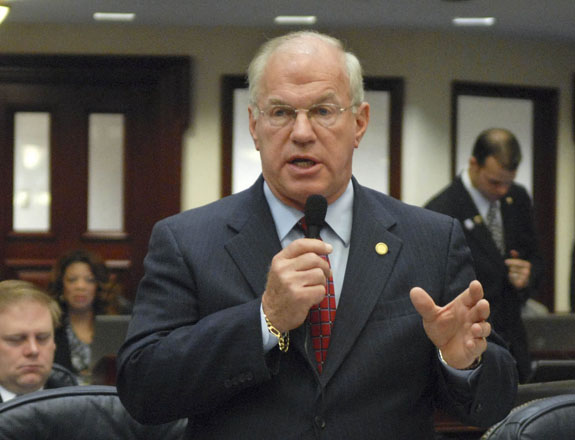
Sen. Alan Hays wants to ban Sharia law in Florida.
By Ralph De La Cruz
Florida Center for Investigative Reporting
With the Florida legislature taking up bills emulating harsh Arizona-style immigration enforcement measures, we’re looking this week at the subject of immigration.
In a previous blog item, I wrote about attending a recent week-long conference on immigration in Oklahoma and Texas. And how I was surprised to learn that the oft-quoted assertion that illegal immigrants are costing us hundreds of billions was untrue.
Even the belief that illegal immigrants are taking jobs away from millions of Americans and lowering wages is not accurate.
It’s due in large part, I learned, to an increasingly educated United States workforce. A workforce less and less likely to compete for jobs with a less-educated illegal immigrant workforce.
“Even the most anti-immigration guys say that, at most, the impact is that five percent of the workforce gets a five percent wage hit,” said Ed Shumacher-Matos, director of the Migration and Integration Studies Program at Harvard University. “The pro-immigration guys say it’s a one to three percent wage hit.”
Not exactly the type of financial impact that normally creates political movements.
And as far as the impact on our national, state and local treasuries, the view from economists is that immigration is largely a push.
Which is why the Florida Chamber of Commerce’s Dr. Dale A Brill, president of the Florida Chamber Foundation, informed legislators in January: “Immigration is critical to Florida’s economy, and further immigration restrictions will have a negative economic impact.”
Even further, Adam Babington, the chamber’s vice president for government affairs, reminded them that immigration enforcement is the responsibility of the feds.
Didn’t matter. The House and Senate judiciary committees moved forward with immigration enforcement bills that are being called “Arizona Lite.”
So, if money isn’t the issue driving the sudden spate of anti-immigration laws, what is?
Fear of change. Fear of a cultural takeover.
And fear is a powerful political force.
The Federation of Americans for Immigration Reform, or FAIR, is pushing many of the state laws. That’s an organization founded by Michigan man John Tanton, who in 1998 wrote:
“In this society, will the present majority peaceably hand over its political power to a group that is simply more fertile. Can homo contraceptives compete with horno progenitivo if our borders aren’t controlled… Perhaps this is the first instance in which those with their pants up are going to get caught by those with their pants down. As whites see their power and control over their lives declining, will they simply go quietly into the night? Or will there be an explosion?”
FAIR is not just opposed to illegal immigration, but wants a severe cutback in all immigration. They’re known as immigration restrictionists.
I could go on and on about FAIR and the web of groups it has spun off to achieve its goal. But FAIR is simply the largest of such groups, and immigration simply the leading edge of the fear of cultural change.
There are other so-called “issues” which have suddenly surfaced during this time of demographic shifts and economic instability. The banning of Sharia Law, the fight against birthright citizenship and the English-only movement fall into the same category.
Which is why groups such as the California Coalition for Immigration Reform (motto: “Fighting the illegal alien invasion for the preservation of our nation”) are now offering programs with panelists such as Phyllis Schlafly, Edwin Meese and U.S. Rep. Peter King.
Anti-gay, anti-immigrant, anti-Muslin.
It’s Fear Inc.
“Twelve million unauthorized immigrants is not a small figure,” said Shumacher-Matos at the immigration conference. “And it seemingly happened overnight. (Cultural fear) is a totally understandable reaction.”
Yep. And I suppose it’s understandable that some will play up that fear.
After all, fear pays. Both economically — Dan Stein, FAIR’s president and CEO, makes $309,439 per year — and politically.
Which is why we now have Florida state legislators filing anti-Sharia bills despite being unable to cite a single instance where Islamic law caused a problem in state courts.
And why we have state lawmakers considering immigration legislation.
